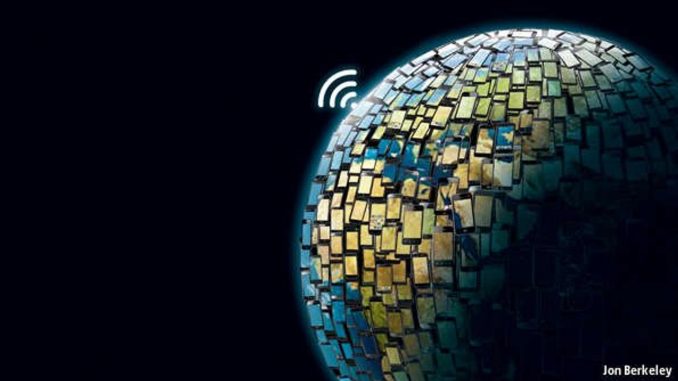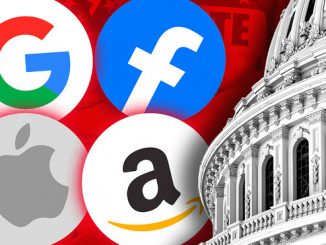
What is Techlash?
“Techlash” is the latest word to explode in the Internet age. It was first coined by The Economist as a synthetic term blend of Tech + Backlash to describe large technology companies such as Google, Amazon, Apple, Facebook, the negative effects of increasing influence on society today.
This blog is a personal insight based on reference and reading that will explain techlash’s hidden public concerns and how to address them. Discuss from the market monopoly of large technology companies, data security and algorithms. Also consider solutions from governments, civil society organizations and technology companies.
Three areas of public concern
- Monopoly

“Us Justice Department launches new antitrust lawsuit against Google,” “Facebook Outage 5 hours, billions people affected,” “Wechat is the only app in China with more than 1 billion active users,” are among the headlines that mark market dominance when searching for related terms about big tech companies. On the one hand, the platform can provide more social services, such as wechat’s payment function and news browsing function. Services beyond the social scope facilitate the daily life of many people, but it is difficult for other enterprises to survive and develop. On the other hand, if a technology company’s software goes wrong, it can have a huge impact on the general public. The Facebook Outage incident happened more than once, and the impact is beyond imagination. In addition to the impact on people who are used to using Facebook for daily communication, many companies use Facebook to attract customers, advertise, Place the order. This resulted in thousands of losses. It is also not uncommon for merchants to use their strong position to set the rules. For example, China’s antitrust regulator recently prepared to fine Meituan food delivery platform about $1 billion for allegedly abusing its dominant market position to the detriment of merchants and competitors. It can be seen that large science and technology monopolies and their increasingly anti-competitive behaviors have brought risks to market fair competition, technological innovation and consumer interests, and predatory market poses threats to all aspects (Rahman, 2020).
- Data security

Digital transformation is profoundly changing every aspect of the way enterprises operate and compete today. While information sharing between many software programs is making people’s lives more convenient, consumers’ awareness of the importance of data privacy is also rising. Data, as the “new oil” of the 21st century, master data is the key to success, so that advertisers and platform of collusion between the things also common occurance, browse information on a website, the next second will be another push software, advertisers can be concluded that 90% of the social relations, privacy problem increasingly serious, whether the information transfer between by effective regulation, The commercialization of personal information has a great impact on personal interests and security (Wang& Chen& Ye& Liu& Yang, 2019). However, it is still not a conclusion that whether personal information is used by others on the web is a kind of privacy invasion. A topic of hot debate on the network violence events, such as bus seats this event in China. The heroine of the incident was found by netizens to have her home address, mobile phone number and other personal information online, which directly affected her normal life. Before the truth of the event itself was not clear, network public opinion had guided the wrong direction, which finally led to the occurrence of the tragedy. In a platform that is not sufficiently regulated, there is a real concern about user privacy.
- Algorithms
Google’s search results are highly accurate in order to get more people to use them; E-commerce vendors recommend related products in order to sell more; Tik Tok can push a large number of videos related to users’ personal preferences so that people can’t stop watching, thus making the software continuously dependent on use. With the wide application of data, algorithmic recommendation technology is bringing people into an era of personalized, customized and more intelligent information transmission. Tiktok’s algorithm is the first to bear the brunt. Tiktok addiction has become a common phenomenon, and its algorithm principles have a positive impact on users’ continuous intentions. The result without intervention will only aggravate the “information cocoon” effect. It is easy to cause isolation between individuals and society (Zhao, 2021). In addition, Pariser also put forward the concept of the Filter Bubble in the book. In other words, information provided by Internet companies will cater to personal preferences, and information inconsistent with users’ own views will be excluded by algorithms, resulting in the confinement of users’ thoughts. These hidden personalized networks are threatening to control users. These problems should be supervised after being recognized, rather than being allowed to control users’ personal choices and affect the safety of Internet users.
If you’re interested in further analysis of filter Bubble, you can watch this TED video:
Consider the extent to which governments, civil society organizations and technology companies can solve the problem
- The government
The government’s direct supervision is stronger, and relevant laws can be issued to punish illegal incidents. However, the disadvantage is that the actual execution power is poor. It will takes a long time to formulate laws and regulations, and if the efficiency is not high, it may not be able to keep pace with the rapid development of technological innovation. In addition, transnational Internet companies are more common, but there is no unified legal regulation under different political and legal systems in different countries, so it is difficult to implement government regulation. For example, the General Data Protection Regulation is mainly aimed at strengthening the Protection of personal data rights, protecting user privacy and supervising Internet platforms. However, as it only applies to EU organizations, large multinational Internet companies such as Facebook are not bound by this policy in countries outside the EU (Christopher Mims., 2018). So there needs to be other regulatory considerations.
- Technology company
The advantage of self-regulation by tech companies is that it is more efficient because platform companies are more aware of the technology and business of their industry and know the specific problems. In addition, technology companies need to commit to social responsibility, which can improve the trust degree of citizens and thus create a good corporate image. However, the self-regulation of the platform is not strong enough, because there is not enough motivation to support, because the regulation may be contrary to the interests of the company, so it is impossible to conduct fair and just regulation, and it is very likely to show one thing behind another. Therefore, companies can try to supervise each other, which is not only conducive to supervision but also to achieve a competitive model.
- Civil society organizations
Citizens’ supervision of technology companies can improve citizens’ awareness of self-information security protection and help themselves understand the risks of the Internet environment. Moreover, it can promote the supervision of public opinion, so that Internet companies can do a good job in order to maintain their corporate image. In addition, the supervision of social organizations can be more diversified, affecting the participation of more social forces to ensure the environmental health of the Internet. However, the supervision of civil society organizations can only advocate and influence, and there is no direct and effective supervision.
Conclusion
All in all, Techlash is a trend that has both good and bad sides. The large-scale development of any kind of emerging industry will have certain threats to be found, but the life-changing power of science and technology is more beneficial to human life. On the premise of ensuring social stability and user safety, the development of science and technology is progressive. The government should invest more in regulation, and tech companies should pay more attention to social responsibility beyond profit. After understanding the Internet structure and personal information security knowledge, users should improve their awareness of self-protection and get sufficient protection from all aspects.
References
Christopher Mims. (2018). Apple, Amazon and Google Also Are Bracing for Privacy Regulations; U.S. technology companies have stayed largely exempt from significant government regulation and self-policing of privacy, but that is about to change. WSJ Pro. Cyber Security.
Pariser, E. (2011). The filter bubble : what the Internet is hiding from you . Viking.
Rahman, S. (2020). Antitrust in Times of Information Technology: An Analysis of Big Tech Monopoly Cases. ProQuest Dissertations Publishing.
Wang, Y., Chen, Y., Ye, F., Liu, H., & Yang, J. (2019). Implications of smartphone user privacy leakage from the advertiser’s perspective. Pervasive and Mobile Computing, 53, 13–32. https://doi.org/10.1016/j.pmcj.2018.12.006
Zhao, Z. (2021). Analysis on the “Douyin (Tiktok) Mania” Phenomenon Based on Recommendation Algorithms. E3S Web of Conferences, 235, 3029–. https://doi.org/10.1051/e3sconf/202123503029

